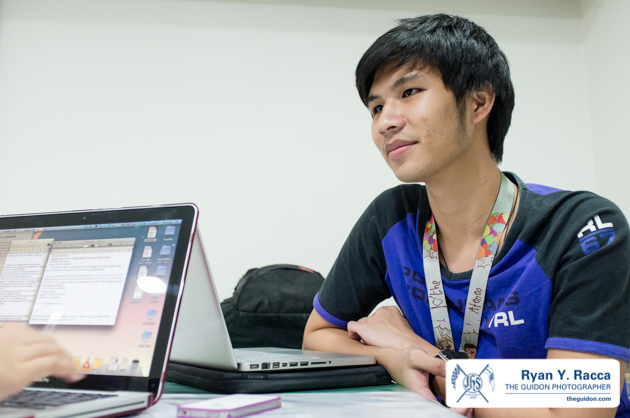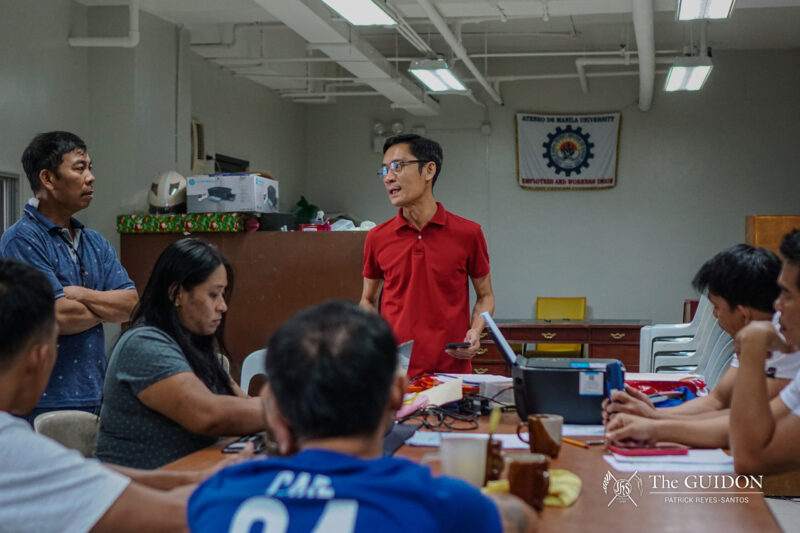WITH THE 2013 Sanggunian Freshmen and Special Elections around the corner, the Ateneo Commission on Elections (Comelec) is working to ensure that last year’s issues of visibility and effective information dissemination will not reoccur.
“[Last year], the promotions weren’t visible and we also lacked visibility during the election period,” Comelec Chief Commissioner Julianne Fajardo said in a mix of English and Filipino.
“[Some Ateneans] said they didn’t feel it was election week,” he added.
The result was a failure of elections, with only the John Gokongwei School of Management reaching the quota of votes.
“We faced an unprecedented number of vacancies,” said Sanggunian President Dan Remo.
He said that in the past, only around two or three officers and a few course representatives needed to be elected during the special elections.
This year, however, Remo estimates that there are over 20 positions that need to be filled during the special elections.
Despite this, he said he is hopeful that the coming elections “will reinvigorate the student population into reinvesting in the student government.”
Criticisms of previous elections
Last year’s general elections had a low voter turnout and caused a failure of elections.
Alliance of Student Leaders (ASL) President Joben Odulio cited the “failure of the past Sanggu units to engage the student body” as one of the possible reasons behind the failure of elections.
“Gone are the days of Sanggu Bantay Halalan 2011, when people—non-candidates and non-partisan—participated in the discussion of the Sanggunian,” Odulio said, noting the role of social media in pushing for the awareness of events like the elections.
Sanggu Bantay Halalan 2011 is a Facebook page that was created two years ago to provide a platform for candidates to answer questions from the student body.
In a previous interview with The GUIDON, former Chief Commissioner and current Commissioner for Finance Tom Sison said improvements in terms of promotions and stronger communication between Comelec and various units in school are needed for the August elections to be successful.
Improved information dissemination
Chief Commissioner Fajardo said that Comelec is expecting fewer problems during the upcoming elections as a result of the steps they have taken to ensure its success.
Aside from improving promotions and visibility, Fajardo said that Comelec is attempting to address the issue of information dissemination.
“We talked to organizations as well as the Sanggu. We went to them so that we could widen our reach with regard to our online promotions,” he said.
Introduction to Ateneo Culture and Traditions coordinators were also tapped to help widen their reach this year.
Fajardo added that the Campus Ministry Office (CMO) would also provide assistance by giving discernment talks for candidates.
“This is the first time to have a perspective from CMO. That’s one of the improvements we made, so that the candidates’ discernment is more Ignatian,” Fajardo said.
A call to reinvigorate student politics
Remo said that this year’s freshmen and special elections serve as a challenge for the Ateneo’s political groups, given the need to get students more involved in the student government.
“There are a lot of changes which I hope will be implemented this year; I really need everybody’s help on that,” he said, adding that he wants to “reinvigorate student politics.”
“That’s why, for this elections, my main expectation is to have students be more involved—not just the candidates but the students themselves,” Remo said.
This desire for a more involved student body is echoed by political coalitions ASL and the Movement for Ignatian Initiative and Transformative Empowerment (Ignite).
Ignite President Lexy Senson said that the failure of elections last year serves as a wake up call to make a change.
“All of us are aware of what happened and all the parties are really working to get that [political] spirit back,” she said.
Gearing up for the elections
Given the challenge of effectively engaging the student body for the elections, the different political groups in the Ateneo stated their plans for August.
Senson said that, for the coming elections, her coalition plans to keep their hold in the School of Humanities. They are also planning to field candidates for the School of Social Sciences.
She further said that Ignite wants to focus on preparing the freshmen for the elections.
“We’re trying to encourage them, considering the political atmosphere of the Ateneo, where it’s not as good as it should be,” Senson said. “We’re trying to groom them so that they can try and help change that atmosphere in general.”
Meanwhile, Odulio said that ASL would try to field as many of its members into the available slots in the Sanggunian as possible, with block representatives being a priority.
“Having more block representative candidates entails more voters,” she said, noting that this would encourage more students to vote because block representatives are situated in the grassroots.
President Remo thinks there is more involvement among the student political groups this year.
“As you can see, the online world is quite abuzz with ASL, Ignite, Crusada (Christian Union for Socialist and Democratic Advancement) actively recruiting members,” he said.
As of press time, representatives from Crusada, the only accredited political party of the Ateneo, have yet to comment on their preparations for the upcoming elections.







